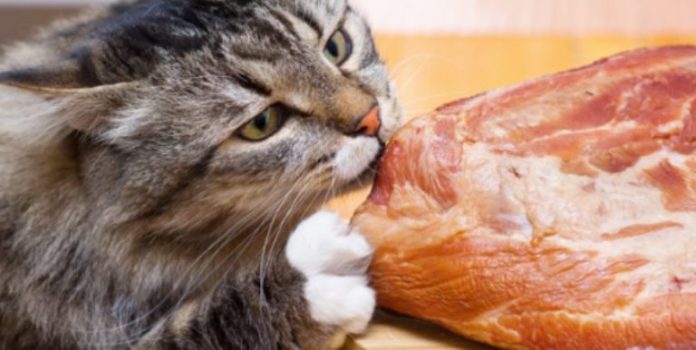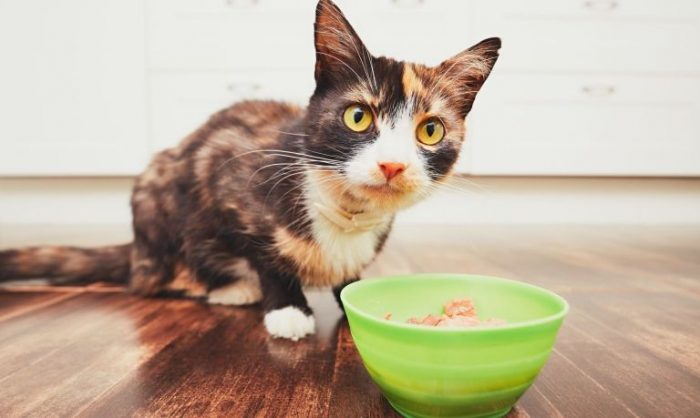A substantial increase in food consumption or ravenous appetite is described as polyphagia which may occur as a result of psychological reasons or diseases. Naturally, overeating should lead to some weight gain or in some cases – obesity, thus, a cat that tends to consume a lot of food and not add weight should be a cause for concern for pet parents. Under such circumstances, the cat should be taken to the vet who will rule out the possibilities of serious health conditions like cancer, diabetes, and hyperthyroidism.
If polyphagia is caused by psychological factors like boredom, depression, and fear of starvation, pet parents can devise means of helping their canine companions to overcome such conditions. In this regard, we are going to look at the reasons some cats are always hungry and the signs that show when your cat is sick.
Table of Contents
Why Is My Cat Always Hungry?
Cat parents know that when their furry friends seem to suddenly dislike their food, it means a trip to the vet, however, a cat that appears to be hungry always also means that all is not well, especially the type that keeps on gulping down food without adding a corresponding weight. The reasons that could be behind a sudden heavy appetite are listed below:
1. Boredom or loneliness may be responsible
The major reason why some cats are always hungry may be attributed to psychological issues. It may be that your furbaby is bored or feeling lonely. Just like some humans tend to consume more when they are bored, the feline population also does the same. Experts recommend that such cats should be provided with more stimulation and a free-feeding style should be avoided.
Providing food in puzzle toys is also a good way of making your kitty work for its meal; this way, the cat’s mind is kept engaged and it burns excess calories as well. There are so many intellectually-stimulating toys that may come in handy, as well as provide the feline with a kitty friend; this keeps the cat’s mind off food. Automatic feeders can also do the magic as they provide access to a measured amount of food at specific times of the day, pre-set by the parent.
2. Depression
When a cat is grieving or depressed, it may take to overfeeding as a self-soothing behavior. A depressed cat should be drawn out of its shell by engaging the pet with gentle interactive play.
3. The cat’s nutritional needs are not met by its food
Another good reason why some cats are always hungry is poor-quality cat food. Once the major nutritional requirements are absent, a cat will continue to gulp down kibble because it can no longer satisfy the true hunger which is for nutrients. This may be the root of its desire to eat non-stop.
4. Aging
Aging comes with natural changes that can make a kitty ravenous all the time. According to expert reports, the natural ability of an animal to digest protein and fat decreases as it ages, the energy requirement on the other hand increase. Cats are said to experience this shift at age 13. Like carbs and proteins, fats provide many calories, thus, a cat that has lost its ability to digest fats will experience a calorie deficit, and to get the full calorie load, the cat will start consuming more. However, before a vet would label aging as the cause of increased appetite, he must eliminate ailments such as diabetes, hyperthyroidism, lymphoma, and intestinal diseases.
5. Addiction
In addition to the sensory pleasure of their food, felines may likely develop an addiction to their mealtimes due to the accompanying attention mealtimes bring with them. Because of this double stimulation, a cat can easily become addicted and end up begging for food regularly. For instance, if the cat gets its food from multiple family members throughout the day, the ensuing addiction will not only be for the meal, but also for the feeling of being looked after by many family members.
Also, cats that are fed table scraps may develop an addiction to the extra food and attention; it will pester you whenever the table leftovers are not forthcoming. Rather than a medical or physical condition, felines that beg for food may have a psychological ‘addiction’, the Telegraph suggests.
6. Fear of Starvation

This is a common situation in neglected cats or those that have to share their mealtimes alongside other kitties. If their next mealtime is uncertain, food stealing or bingeing may be the result. This is among the reasons why some cats are always hungry.
7. Environment
A cat that is exposed to so many distractions in the environment may end up being hungrier than normal as the disturbances won’t allow it to eat enough. Owners of multi-pet households should be well aware of the fact that there is always a dominant kitty that gets the first dibs. The dominant cat will only give chance for the next kitty up in the hierarchy to eat when it has had its fill.
Thus, that skinny feline whose position on the hierarchy happens to be below will likely eat less, besides; others may possibly steal food from him. This kind of scenario calls for the cats to be separated at mealtimes so they can enjoy meals in relative peace. Other environmental distractions that affect cats during mealtimes may come in the form of a nearby construction site or some raucous kids in the household.
8. Pregnancy
If your female cat has not been neutered and is in contact with male cats, pregnancy may be the reason why it is constantly hungry, but in this situation, it gains weight.
Factors that Cause Cats To Eat A Lot But Look Like They Are Starving
Some cats are always hungry but never put on weight due to some major ailments which include;
1. Intestinal parasites
We can also refer to intestinal parasites as worms; these parasites take away all the nourishments from what the cat consumes. This is why a cat keeps gulping down large quantities of food and still feels hungry because it has very little nutrients for itself after feeding the parasitic worms. Cats that feed on fleas, as well as outdoor cats are the ones predisposed to intestinal parasites like roundworm which are highly contagious to humans. A microscopic examination of the cat’s feces will show the kind of parasite in your cat’s intestinal tract.
2. Hyperthyroidism
Hyperthyroidism is a medical condition that happens when a cat’s thyroid gland becomes overactive; this leads to a major increase in a feline’s appetite as its metabolism burns a lot of calories. Hyperthyroidism is diagnosed through a simple blood test and is treatable with medication.
3. Diabetes
Diabetes results from the inability of the pancreas to produce enough insulin which is responsible for converting sugar into energy. Once this happens, a cat will continue to eat excessively and still feel hungry, besides, such cats never add weight. Diabetes can be controlled with insulin injection which returns the feline’s appetite back to normalcy.
4. Cancer
Solving the mystery of why some cats are always hungry may lead a vet to suspect cancer; however, this only happens after all other ailments have been ruled out. Though it is rare for cancer to make a skinny feline to be ravenous, we have seen instances where a tumor made a cat constantly hungry. For instance, a tumor that is located along the gastrointestinal tract will cause an adverse effect on the cat’s ability to absorb nutrients, just like FIBD.
Again, tumors located in another part of the body may possibly facilitate over secretion of some hormones such as IGF-1; this makes the affected feline to burn more energy. In turn, the cat may likely crave more food. Important to note that these are uncommon instances, usually, cancer decreases appetite in its victims.
Luckily, most members of the feline population just love to eat with their day revolving around meals and naps. As long as your feline companion has a stable weight, it isn’t having diarrhea, vomiting, or acting in a strange way, it is most likely that your furry friend is just a food-motivated feline.
5. Digestive Tract Issue
Gastrointestinal issues like Inflammatory Bowel Disease (IBD) can stall the absorption of nutrients from food; this may lead to constant hunger. IBD causes inflammation of the wall of the intestinal which in turn leads to vomiting, diarrhea, loss of weight, and increased appetite in an attempt to shore up for lost energy.
Conversely, cats with IBD can have appetite loss. Similar signs can emanate from intestinal tumors which come in different types, but most common among them are lymphoma and adenocarcinoma; these are usually found in older cats. Again, signs that occur as a result of blockage or lack of nutrient absorption may include diarrhea vomiting, and weight loss, accompanied by either increased or decreased appetite, depending on the stage.
Read Also: Do Cats Have Nightmares Like Humans?
How To Know If Your Cat Is Sick or Down With Something
To know a cat that is sick or down with something, indications abound;
- Vomiting – Rare vomiting or intermittent hairball discharge may not be a concern. However, a trip to the vet is called for if it exceeds that.
-
Diarrhea – This may be an indication of intestinal parasites, dietary indiscretion, and more. This may cause dehydration and in some cases further intestinal inflammation.
. - Loss of appetite – Get the veterinarian involved whenever your canine forms the habit of skipping meals or at worse stops eating entirely. Some cats take to eating minute quantities which can all engender fatty liver or hepatic lipidosis; this is a serious clinical condition.
4. Increased appetite – On the flip side, an increased appetite may also mean that something is wrong with your furbaby, especially in older cats. Hypothyroidism may well be the culprit.
5. Weight changes – Both weight gain and weight loss may signify an underlying health problem. While weight loss can be more urgent in the short run, weight gain tends to cause more problems over time.
- Lethargy – Though this may be subtle, sluggishness may be a sign of a problem. Something may be going on with a cat that lies around most of the time, sleeps the day away, or just has a very low energy level.
-
Increased thirst – With cats, increased thirst can be interpreted in several ways. It can mean kidneys or urinary tract issues.
-
Changes in urination – This can also indicate kidney or urinary tract infection issues. An immediate visit to the vet is in order if you notice changes in your cat’s urination like the quantity of urine or frequency, inappropriate urination, straining to pass urine with nothing coming out, and blood in the urine
-
Changes in breathing – this can come in the form of rapid breathing, wheezing, raspy breathing shortness of breath.
-
Discharge from eyes or nose – In this case, an upper respiratory infection may be the culprit.
-
Ear debris or discharge – This might mean the presence of ear parasites or an ear infection.
Other indications that your cat may be sick include skin irritation, hair loss, increased vocalization, over-grooming, personality changes limping and trouble jumping up, swellings, and bad breath.
